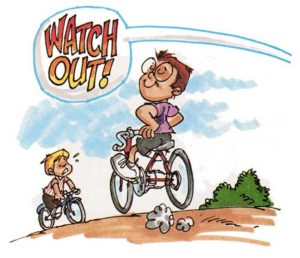by James Burns | Nov 4, 2018 | Academics, Anti Bullying, Anti Bullying 101, Classroom Activity, Education, James Burns, Teachers, The Bully Proof Classroom, The Ramblings of a Dinosaur
I really hate to be the bearer of bad news but the reality of life is not every-one is going to college when they leave high school. If this statement is really true then why does education deal with everyone like they’re college material? I graduated from high school almost forty years ago.
When I was a student there were three courses of study that I could take. The first course was college prep; this provided some challenging classes that got you ready for the rigors of college. The second course was business. This prepared students for the business world and exposed students to things like Junior Achievement, and a club called Future Business Leaders of America. (FBLA) The third course of study was general studies. This was a hodgepodge of courses that was like a high school liberal arts program.
I graduated from the eighth grade and it was recommended by my eighth grade teachers that I be placed in a general studies program. I didn’t choose general studies I was placed in it. I took just about any classes I wanted, from college prep classes to general classes, and I did fine. I really wasn’t college material, but I got accepted into a state school and received a college diploma. I still haven’t figured out what was so horrible about a group of teachers recommending that I be placed into a course of studies that was based on my abilities.
The world of education has gotten away from something that was very common many years ago, and that’s called tracking. There were always two or three classes in every grade that addressed the individual needs of students who needed to be challenged, and the needs of students who needed extra help. The groups were never co-mingled because the instruction would be too hard for some of the students and not hard enough for other students. Somewhere along the way someone came up with idea that tracking kids had a negative affect on their self esteem, so it was decided that all students should be placed in the same classroom in order to receive the same instruction. This was supposed to improve the way a child felt about himself as a student. It would make him feel smarter.
Nothing could be further from the truth. Students who have difficulty and who are placed in a classroom with kids who are more academically advanced than them are always trying to figure out why they can’t do the same work as the smarter kids. In simple terms they start to wonder, why am I so dumb? The other challenge is for the teacher who has to spend an obscene amount of time working with the slower students, while the more advanced students may be left to work by themselves.
The idea that all students can learn at the same pace and in the same classroom is flawed and, believe it or not, has become a huge money maker for those who have been smart enough to take advantage of this movement. Differentiated Instruction, Multiple Intelligence, and Inclusion strategies are all programs that have been born out of the idea that all students should be heterogeneously grouped. These programs were developed and sold to colleges and public schools as a ruse to convince educators that this type of education works for all students.
Once the decision is made to implement the program thousands of dollars have to be spent in teacher training so the teachers understand the process. This just puts more stress on the teacher and gets them more concerned about the means of educating their students and not the end which is have the students mastered the material that was taught.
The developers of these programs make their money, but it is costly to the school districts that choose to use them as well. Most elementary classes today have two and maybe three teachers present in one room in order to work with the varying levels of the students. One teacher in the room may only work with 4 or 5 students. This same teacher could work with 20 students if the students were tracked. Districts pay thousands of dollars more in teacher salaries by hiring one teacher to work with a very small number of students. Many students are not prepared for or capable of some rigorous form of education that does nothing but constantly frustrate them academically.
During the last 40 years, I have witnessed the dismantling of industrial arts shops that were used to introduce students to carpentry, electronics, metal work, auto mechanics, and even home repair. These shops were dismantled in order to make room for huge computer labs, additional classroom space. One district used the space for a weight room for the football team. Does anyone need a carpenter an electrician or a plumber anymore? Better yet does anyone know what they charge? These are fine careers that pay a handsome salary.
Education has even moved away from shared time programs that train and apprentice students for careers that society needs to support the economy. The Voc-Tech programs as they’re called seemed to focus more on technical aspect than on the vocational. The majority of these programs have rigorous acceptance requirements and works with the students who have the ability to perform scholastically. The balance of these programs work with students who are cognitively impaired and provide a setting similar to that of a sheltered workshop of the 1970’s and 80’s.
The vocational schools are not providing enough training for those students who truly want to become trained carpenters, plumbers, and electricians. The real tragedy of the situation is that there are students who want to become master tradesmen. In order for them to accomplish their goal they must enroll in post secondary programs at their cost and spend another two or three years in training in order to do something that could have otherwise been provided at the high school level.
I have a wonderful brother in law who is a master tradesman and can do anything from carpentry to plumbing, and electrical work. He operates heavy machinery, installs gas tanks and pumps, and is a demolition expert. He can do anything. He is now 65 years old and continues to work at his crafts. I know that he didn’t go to college. He learned many different trades as a young man by doing the work himself and by working with other people. I know he was definitely smart enough to go to college but as he was growing up it may not have been his first choice. He chose to learn a trade or should I say many trades. He learned to do the jobs that not everyone could do or wanted to do.
Everyone is not cut out to go to college, or to even be in a classroom with kids who are. I don’t know what my home would look like if I didn’t have a handyman. I also don’t know how long my car would keep running if I didn’t have a trained mechanic. My brother in law doesn’t have to worry about these things because he can fix and repair and build. The other thing that my brother in law doesn’t have to worry about is money because he is a millionaire.

by James Burns | Oct 28, 2018 | James Burns, Parents, Teachers, The Bully Proof Classroom, The Ramblings of a Dinosaur
Going to a Catholic grammar school for nine years had its benefits. We had to wear uniforms so there wasn’t any clothes competition. We went to church all the time so we got some formal spiritual training. You couldn’t even think of using profanity because you thought the nuns could read your mind and would find out what you were thinking. We learned good penmanship. We were respectful, compliant, and responsible.
The crazy thing is no one gave me a choice in any of these areas I was forced to do them. It wasn’t like the nun said to me you can go to church if you like, or why don’t you try to hold your pencil this way, or is that the way to speak to someone? If I didn’t do it the way it was supposed to be done, my blood stains would be on the floor.
As I look back at this experience, the one thing that I realize is that this type of education taught me something that no one talks about today and that’s self-control. The majority of the problems that a person faces in their life are related to a lack of self-control. Everybody either eats too much, drinks too much, spends too much, can’t control their temper, lusts after things that they can’t have like someone else’s spouse, and develops habits that they can’t break that could kill them or someone else like smoking or driving too fast. Now why does all this happen? Well, I never remember my parents or any teacher in my life saying to me the choice is yours: You can smoke or not. You can lose your temper or not. You can overeat or not.
Self-control is taught. If I did something that exhibited a lack of self-control, I got grabbed by someone and got reamed out or in the worst case scenario got clobbered. I was taught to wait on line, raise my hand, take my time, practice until I got it right, memorize, and I got drilled on skills that every-one knew were necessary for life long success. Look, musicians practice endless hours to perform a single piece of music. Students study instead of watch TV. Athletes devote years of their lives to prepare for an Olympic event that may last only a few minutes.
The concepts of self-control, delayed gratification and discipline seem so counter to our cultural values. We use our credit cards because we want things right away. We become impatient if we wait more than a few moments at a drive-through at McDonald’s. We eat ourselves into obesity and poor health because it feels good, with little consideration of the long-term consequences. Self-control should be graded in school and looked at as a quality necessary for success as an adult. If you or someone you know is having trouble with self-control I have a good friend named Sister Houlihan who still thinks self-control is important. She is 4 feet 8 inches tall and she can still make a grown man hold his pencil the right way!
[ecwid_product id=”117250099″ display=”picture title price options addtobag” version=”2″ show_border=”1″ show_price_on_button=”1″ center_align=”1″]
by James Burns | Jun 4, 2018 | Bully Proof Classroom, Compliance, James Burns, Parents, Teachers
 STOP asking and Start Telling. If you want students to comply you have to stop giving choices and tell students exactly what you want them to do. Choices are something we all want and should be offered at times, but when there is a specific behavior you that you want your students to exhibit allowing choice only promotes confusion on the part of the students and frustration for the teacher. Compliance before choice is something that all students should understand. Students can’t say and do what they want when they want to do it. This 13 page guide provides instructions on how to do it with illustrations from the authors life and provides the language that will empower the teacher and create a positive school climate.
STOP asking and Start Telling. If you want students to comply you have to stop giving choices and tell students exactly what you want them to do. Choices are something we all want and should be offered at times, but when there is a specific behavior you that you want your students to exhibit allowing choice only promotes confusion on the part of the students and frustration for the teacher. Compliance before choice is something that all students should understand. Students can’t say and do what they want when they want to do it. This 13 page guide provides instructions on how to do it with illustrations from the authors life and provides the language that will empower the teacher and create a positive school climate.
[ecwid_product id=”117206152″ display=”picture title price options addtobag” version=”2″ show_border=”1″ show_price_on_button=”1″ center_align=”1″]
by James Burns | Mar 26, 2018 | Academics, Anti Bullying Coaching and Resources, Careless, Teachers, The Bully Proof Classroom
Children today bring home report cards for their parents review about four times during the school year. Parents can attend two to three parent teacher conferences to receive reports on how their children are doing academically and behaviorally. During these conferences teachers at times communicate to parents that their sons or daughters are doing fine, but they need to take their time with their work because they just seem to make careless mistakes. In reality their children are not doing well academically but for some reason teachers feel that poor student performance is a reflection of their teaching ability, not a student’s work ethic. There is only one way to measure a student’s performance and to determine whether a not they have mastered the material that was taught, and that’s by assigning a grade associated with the work that the student completes. Grades like and A. B. C. or 80%, 90%, or 100% are part of reality and children and parents need to be given a clear idea of whether or not the material that was taught was actually mastered with an appropriate grade assigned.
 So, why are children careless? The biggest reason is that teachers from the first grade on accept work that is sub par, and doesn’t communicate the truth to the student or parent that the work submitted is unacceptable. Carelessness just becomes part of life and parents believe their child isn’t academically deficient but just makes careless mistakes, doesn’t pay attention, is a day dreamer, or just plain old lazy. The truth is the child hasn’t mastered the material that was taught.
So, why are children careless? The biggest reason is that teachers from the first grade on accept work that is sub par, and doesn’t communicate the truth to the student or parent that the work submitted is unacceptable. Carelessness just becomes part of life and parents believe their child isn’t academically deficient but just makes careless mistakes, doesn’t pay attention, is a day dreamer, or just plain old lazy. The truth is the child hasn’t mastered the material that was taught.
The way for teachers to resolve the problem is to raise their level of expectation and to put in place more stringent grading practices that give a true indication of the student’s performance. By doing this students will have a better understanding of their abilities, and when taken seriously will motivate the student to pay attention, and to be more careful with the work that is turned in.
Revise – Re-do – Retake
To start this process any work that that is handed in whether it is homework, class work, tests, or quizzes should never just be handed back to the student with the mistakes noted. The work should be handed back with the mistakes noted and with the understanding that if the student grade was 80% or less the entire assignment must be done again. It may take a few re-do’s but once the student gets the idea that certain grades are unacceptable they will be less careless and more careful when they turn in assignments the first time. This not only motivates the student but gives them the opportunity to master material that would otherwise just be handed back to them with a poor grade. Students must revise writing assignments, re-do, careless work, and retake tests if their grade was 80% or less.
Poor academic performance is a result of students not having the necessary pre requisite skills to perform at a higher level. The only way to resolve the problem is to go back to the academic areas that were not mastered by the student and make them repeat the areas of deficiency until mastered. To a school district this can be costly and create a great deal of parental and community discord. So, by today’s standards that is almost impossible to do. Why not be tougher on students academically the first time around and really get them to master the material that is being taught. Stop using the excuse that the students are careless and start using tougher grading practices that will make students more careful and most of all more responsible for their academic progress..
Helping Students Retain Information
by James Burns | Mar 7, 2018 | James Burns, Parents, Podcast, Teachers, The Bully Proof Classroom, Uncategorized
Please go to http://bullyproofcla sroom.com/parents-can-bebullies-too-2 and read this article. Based upon the previous tip, it is obvious that bullying is wrong and it will not be tolerated. But, what do you do when parents are bullies? The real reason why parents argue with teachers and administration is because they will never win the argument at home with their own child who they, as the parent, never corrected. They are, in many ways bullied at home and react out of fear; this fear is taken out on the teacher in the form of anger and rage. They are not doing their child any favors because their child is going to have a difficult time in life when Mom and Dad are not around. What’s the answer? When dealing with a parent who is a known bully, never go at it alone. Always meet with them when you have the support of your colleagues or the administration. Parents who are bullies will usually believe what their son or daughter tells them. Things like “the teacher doesn’t like me,” or “the teacher is always picking on me” are common cries from students who are bullies. When you meet with these parents, they go on the attack and become accusatory, putting you as the teacher on the defensive. Chances are, if their son or daughter is a bully, they are a school-wide problem as well, and other teachers and administration have observed their behavior. Having the support of your team when meeting with a parent avoids the idea that you are picking on their child.
sroom.com/parents-can-bebullies-too-2 and read this article. Based upon the previous tip, it is obvious that bullying is wrong and it will not be tolerated. But, what do you do when parents are bullies? The real reason why parents argue with teachers and administration is because they will never win the argument at home with their own child who they, as the parent, never corrected. They are, in many ways bullied at home and react out of fear; this fear is taken out on the teacher in the form of anger and rage. They are not doing their child any favors because their child is going to have a difficult time in life when Mom and Dad are not around. What’s the answer? When dealing with a parent who is a known bully, never go at it alone. Always meet with them when you have the support of your colleagues or the administration. Parents who are bullies will usually believe what their son or daughter tells them. Things like “the teacher doesn’t like me,” or “the teacher is always picking on me” are common cries from students who are bullies. When you meet with these parents, they go on the attack and become accusatory, putting you as the teacher on the defensive. Chances are, if their son or daughter is a bully, they are a school-wide problem as well, and other teachers and administration have observed their behavior. Having the support of your team when meeting with a parent avoids the idea that you are picking on their child.

by James Burns | Feb 4, 2018 | Anti Bullying Coaching and Resources, James Burns, Teachers, The Bully Proof Classroom

Often times when we hear things or see things that require us to take action, we become fearful and can often rationalize it away. This can be done by convincing ourselves that it is not as serious as we thought, the kids were only kidding, or worse yet, act like we never saw it or heard it. Years ago, teachers used to quake in fear at the thought of reporting a case of child abuse to the authorities. As an administrator, I was often asked to make the phone call by a teacher. I did on one occasion and was told that the person who observed the abuse or heard about it needed to make the report. With the emphasis placed so heavily right now on anti-bullying, it is critical for teachers to understand their resources when dealing with an incident of bullying. Teachers are the first responders and are in the trench observing students on a daily basis. If you hear or see what you believe is a bullying incident, know who to go to for help. An administrator or guidance counselor is a good place to start. In doing this, you will never be alone in the ownership process. You will always have full ownership if you don’t report it at all.










